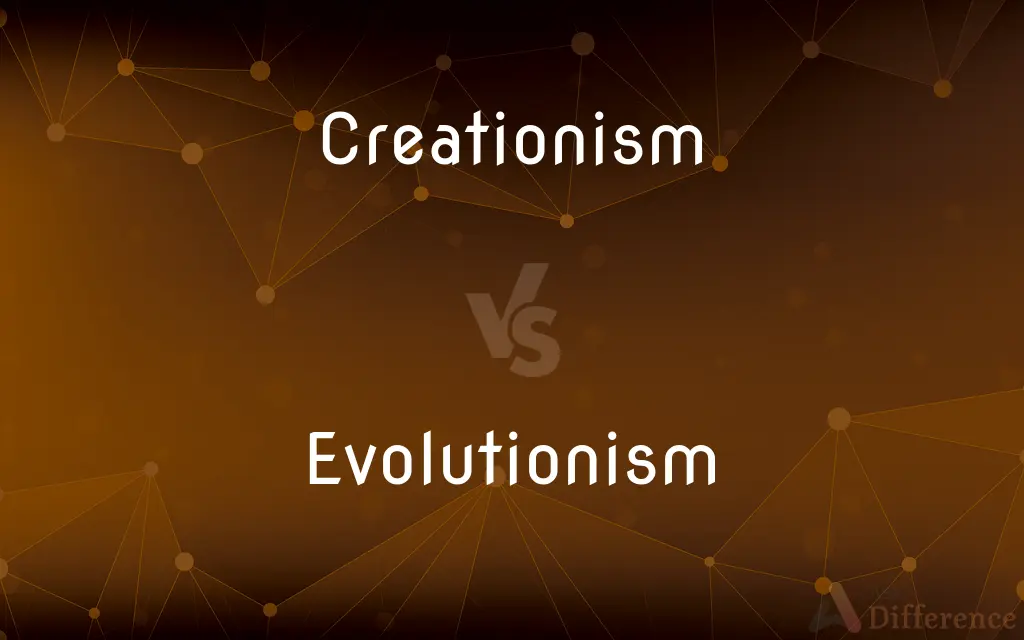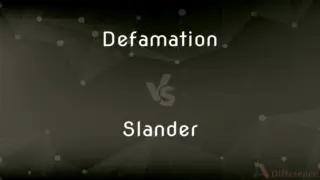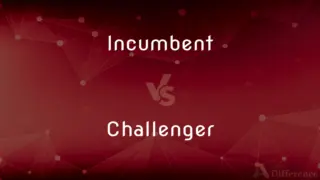Creationism vs. Evolutionism — What's the Difference?
By Tayyaba Rehman & Fiza Rafique — Published on September 22, 2023
Creationism holds that life, the Earth, and the universe were created by a supreme being; Evolutionism argues that life evolved over time through natural selection and random mutation.

Difference Between Creationism and Evolutionism
Table of Contents
ADVERTISEMENT
Key Differences
Creationism is the belief that the universe, Earth, and life were created by a divine or supernatural entity. This belief often relies on religious texts or revelations as its source of truth. Evolutionism, on the other hand, is a scientific theory that posits life has evolved over time through natural processes like mutation and natural selection. It is backed by empirical evidence, such as fossil records and DNA comparisons.
While Creationism often relies on faith and religious doctrine, Evolutionism is founded on scientific observation and experimentation. In Creationism, the role of a creator or divine being is central, and the complexity of life is often cited as evidence of intentional design. Evolutionism, however, does not require a creator and explains the diversity and complexity of life through mechanisms like natural selection and mutation.
Another distinction lies in how each view approaches change over time. Creationism often posits that life forms were created in their current state and have not changed significantly since. Evolutionism posits that life forms have evolved over time, adapting to their environment.
In public discourse and education, Creationism and Evolutionism have sometimes been at odds. While Evolutionism is widely accepted in the scientific community, Creationism continues to be a belief held by many people, often for religious reasons. Legal and educational debates have arisen around whether Creationism should be taught alongside Evolutionism in science classrooms.
Comparison Chart
Basis
Faith, religious texts
Scientific evidence
ADVERTISEMENT
Role of a Creator
Central
Not required
Explanation of Life
Created by a divine entity
Evolved through natural processes
Change Over Time
Limited or none
Constant and ongoing
Use in Education
Debated, often religiously motivated
Widely accepted in scientific curricula
Compare with Definitions
Creationism
Intelligent Design
Some consider Creationism a form of intelligent design.
Evolutionism
Natural Processes
Evolutionism describes life as a result of natural selection.
Creationism
Faith-based
Creationism relies on faith rather than scientific evidence.
Evolutionism
Genetic Mutation
Mutation is a key mechanism in Evolutionism.
Creationism
Static Forms
In Creationism, life forms are believed to be unchanging.
Evolutionism
Adaptable Life
Evolutionism posits that species adapt over time.
Creationism
Divine Origin
Creationism holds that life originated from a divine creator.
Evolutionism
Fossil Record
Evolutionism is supported by the fossil record.
Creationism
Religious Texts
Creationism often references religious texts for its claims.
Evolutionism
Scientific Theory
Evolutionism is a scientific theory backed by empirical evidence.
Creationism
Belief in the supernatural origin of the universe or of humans and other living things, especially as based on the literal interpretation of the account of the creation related in the Bible.
Evolutionism
A theory of biological evolution, especially that formulated by Charles Darwin.
Creationism
(theology) The Abrahamic doctrine that each individual human soul is created by God, as opposed to traducianism.
Evolutionism
Advocacy of or belief in biological evolution.
Creationism
Any creationary belief, especially a belief that the origin of things is due to an event or process of creation brought about by the deliberate act of any divine agency, such as a Creator God (creator god).
Evolutionism
(countable) Any of several theories that explain the evolution of systems or organisms.
Creationism
The belief that a deity created the world, especially as described in a particular religious text, such as the Quran or the Book of Genesis.
Evolutionism
(uncountable) The belief in the universal presence of evolution.
Creationism
The doctrine that a soul is specially created for each human being as soon as it is formed in the womb; - opposed to traducianism.
Evolutionism
(uncountable) The advocacy of Darwinian evolution by natural selection (Darwinism).
Creationism
The literal belief in the account of creation given in the Book of Genesis;
Creationism denies the theory of evolution of species
Evolutionism
The theory of, or belief in, evolution. See Evolution, 6 and 7.
Common Curiosities
Can you believe in both Creationism and Evolutionism?
Some people attempt to reconcile the two, but they are fundamentally different approaches.
Is Creationism based on science?
Creationism is generally based on faith and religious texts, not scientific evidence.
What is Evolutionism?
Evolutionism is the scientific theory that life evolved over time.
What is Creationism?
Creationism is the belief that life was created by a divine being.
How does Creationism explain the diversity of life?
Creationism often posits that life was created in its diverse forms by a divine being.
Is Creationism taught in schools?
In the U.S., Creationism is generally not taught as science but may be discussed in religious studies.
Is Creationism globally accepted?
Acceptance of Creationism varies by culture and religious belief.
Is Evolutionism based on science?
Yes, Evolutionism is backed by scientific evidence.
How does Evolutionism explain the diversity of life?
Evolutionism explains diversity through natural selection and mutation.
Is Evolutionism taught in schools?
Yes, Evolutionism is a standard part of science curricula.
Who supports Creationism?
Creationism is often supported by religious individuals or organizations.
Does Evolutionism allow for change over time?
Yes, Evolutionism posits ongoing change and adaptation.
Who supports Evolutionism?
Evolutionism is widely supported by the scientific community.
Is Evolutionism globally accepted?
Evolutionism is globally accepted within the scientific community but may not be universally accepted by all cultures or religious groups.
Does Creationism allow for change over time?
Generally, Creationism holds that life forms were created in their current state.
Share Your Discovery

Previous Comparison
Defamation vs. Slander
Next Comparison
Incumbent vs. ChallengerAuthor Spotlight
Written by
Tayyaba RehmanTayyaba Rehman is a distinguished writer, currently serving as a primary contributor to askdifference.com. As a researcher in semantics and etymology, Tayyaba's passion for the complexity of languages and their distinctions has found a perfect home on the platform. Tayyaba delves into the intricacies of language, distinguishing between commonly confused words and phrases, thereby providing clarity for readers worldwide.
Co-written by
Fiza RafiqueFiza Rafique is a skilled content writer at AskDifference.com, where she meticulously refines and enhances written pieces. Drawing from her vast editorial expertise, Fiza ensures clarity, accuracy, and precision in every article. Passionate about language, she continually seeks to elevate the quality of content for readers worldwide.
















































